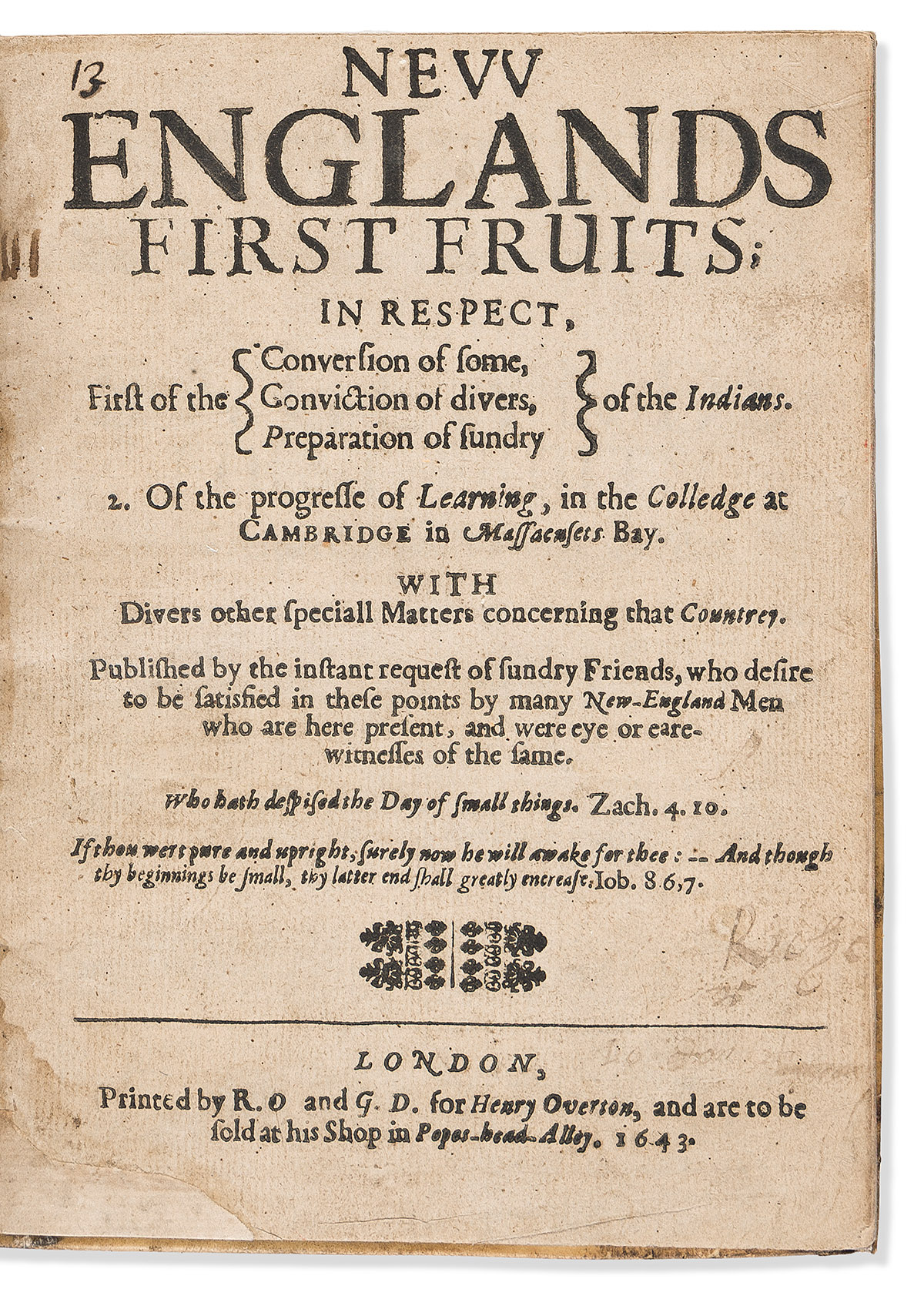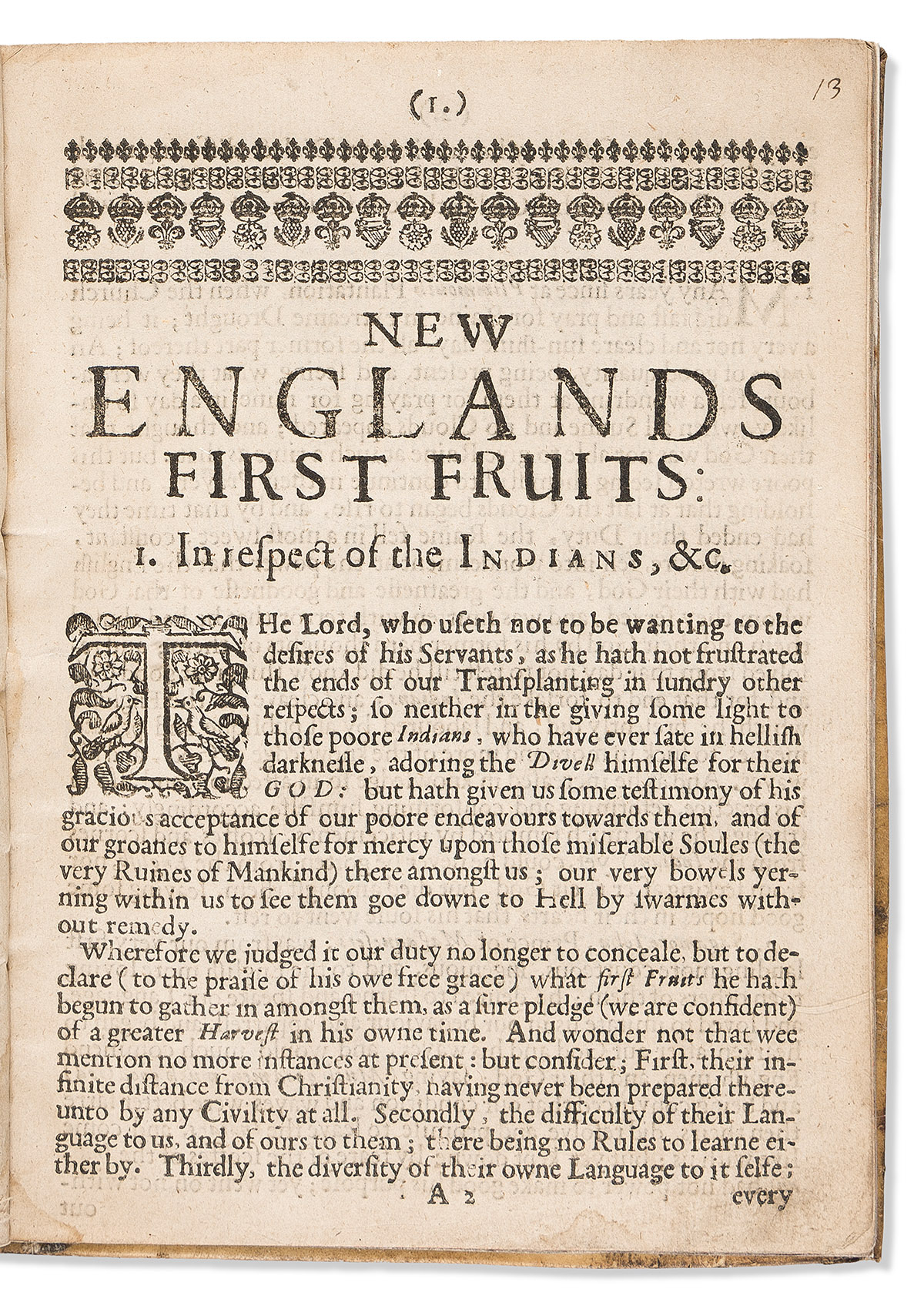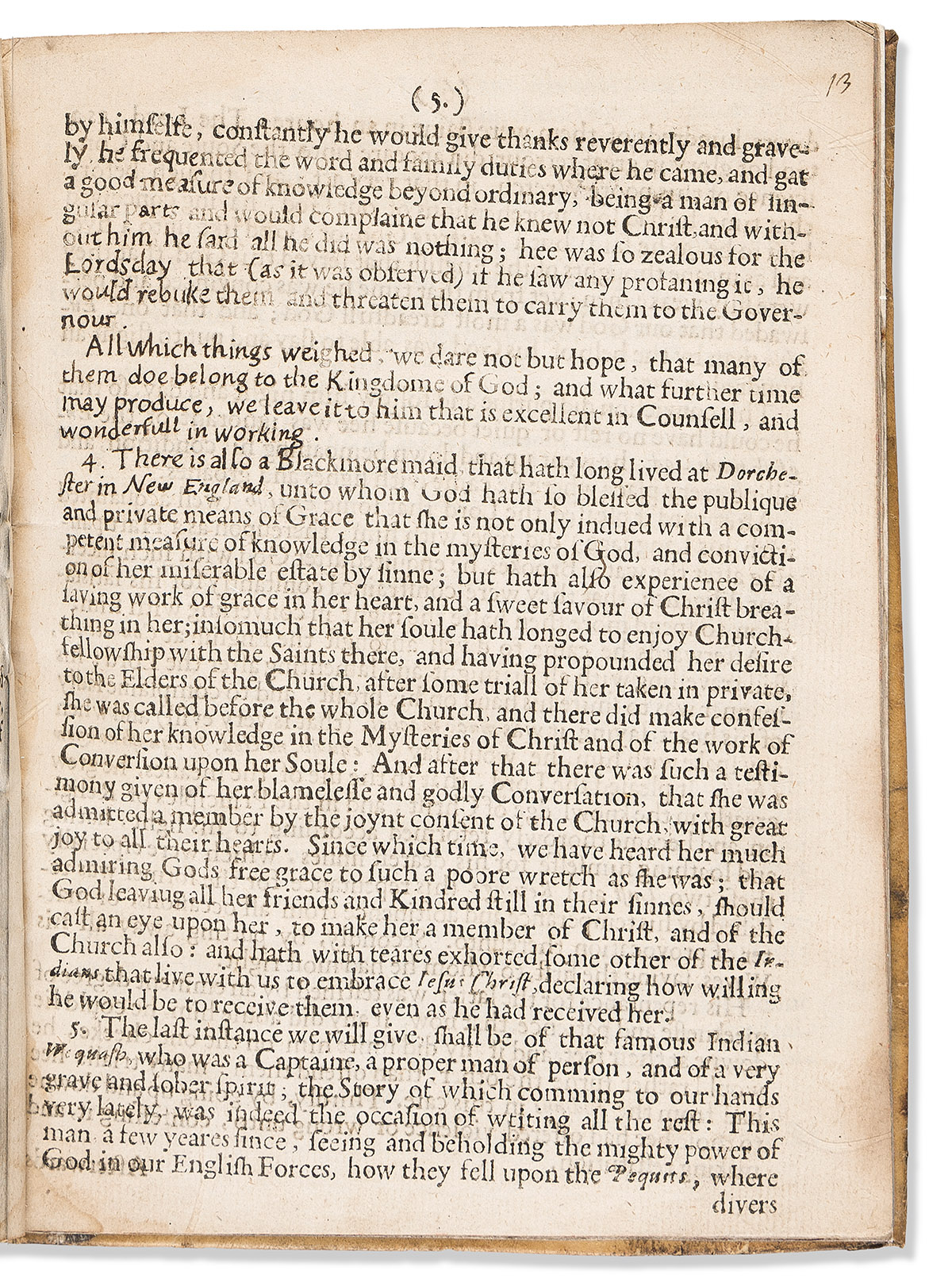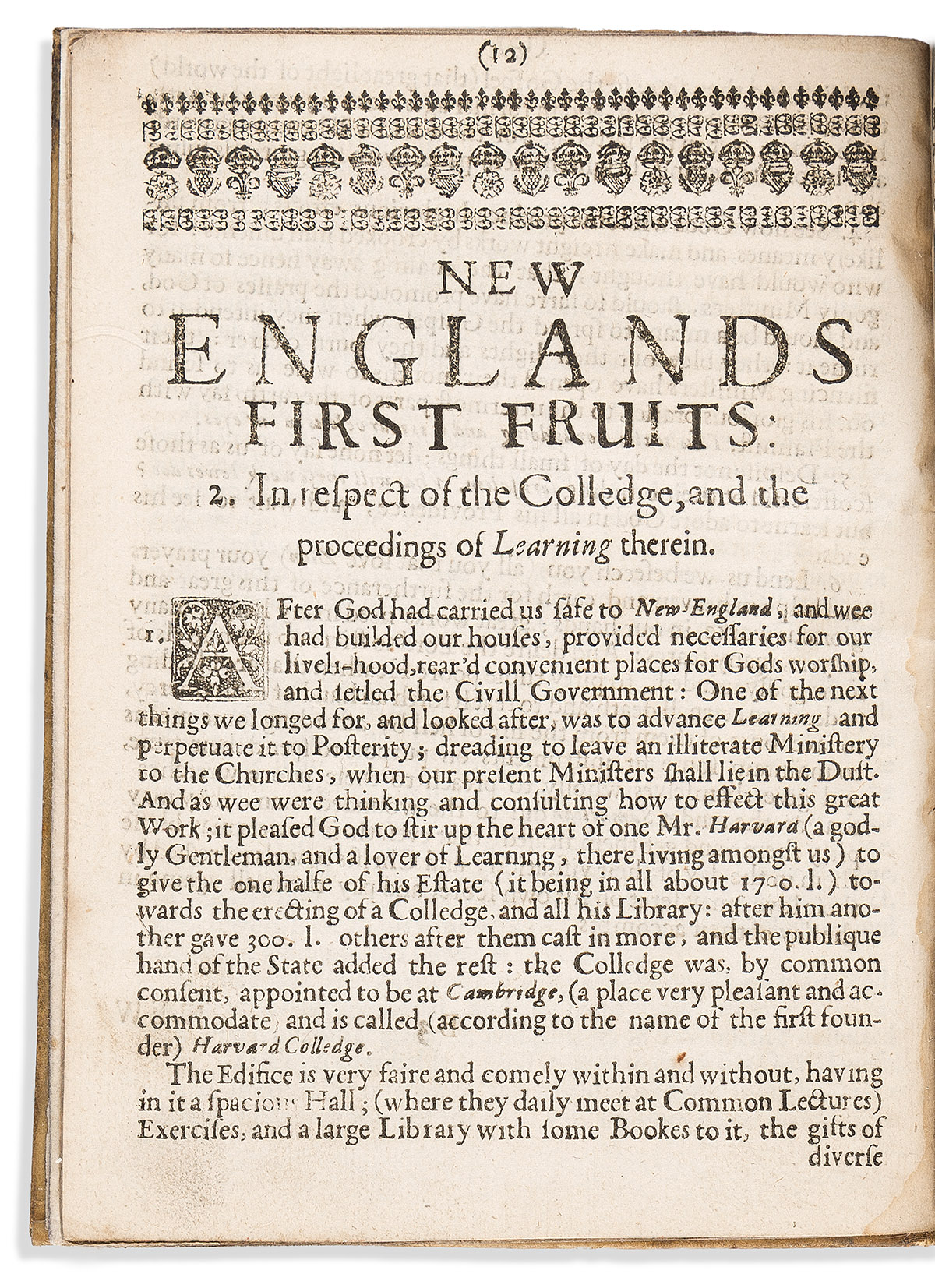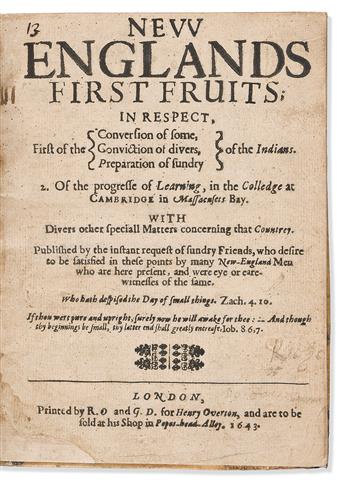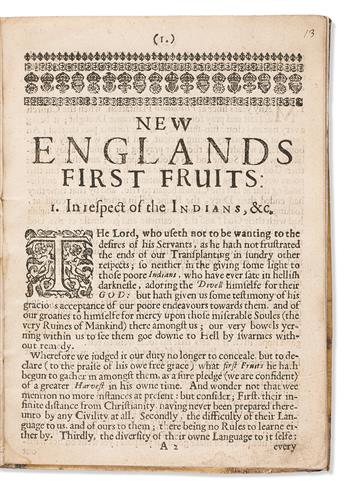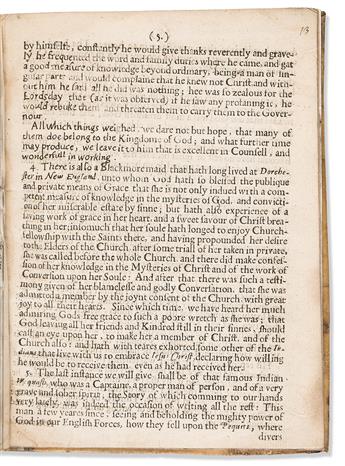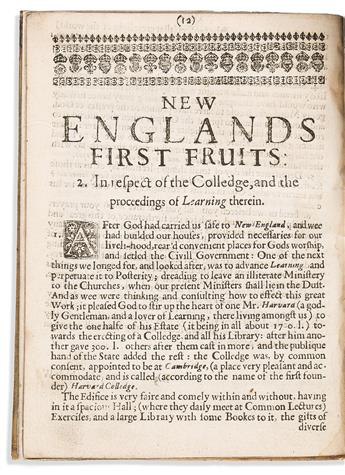Sale 2687 - Lot 173
Price Realized: $ 48,000
Price Realized: $ 60,000
?Final Price Realized includes Buyer’s Premium added to Hammer Price
Estimate: $ 40,000 - $ 60,000
(MASSACHUSETTS.) New Englands First Fruits . . . First of the Conversion of Some of the Indians, 2. of the Progresse of Learning, in the Colledge at Cambridge in Massacusets Bay. [2], 26 pages (irregularly paginated as issued). 4to, later limp vellum, slightly bowed; a bit of restoration to lower margin of title page, part of page 5 over-written in ink, minimal dampstaining, lacking leaf D3 (errata) as usual; early inscription on rear flyleaf. In modern cloth folding case. London: R.O[ulton] and G.D. [Gregory Dexter] for Henry Overton, 1643
Additional Details
First edition, first state, of the first of Eliot's Indian Tracts.
"New England's First Fruits" shares the earliest spiritual work of the Massachusetts Bay Colony with an English audience: the conversion of Indians, and the establishment of Harvard College. It was the first in a series of eleven pamphlets which promoted the good works of Puritan evangelists, produced by the famous missionary and linguist John Eliot in conjunction with the Corporation for the Propagation of the Gospel among the Indians of New England.
The first 11 pages describe the young colony's evangelization efforts among the Indians, hampered by enormous language and cultural barriers. "Sagamore John" (Wonohaquaham), a Pawtucket sachem who expressed interest in Christianity, was stricken by smallpox, summoned the Reverend John Wilson to his deathbed, "and committed his onley Child to his care, and so died" (page 3). Similarly, Wequash Cooke (son of a Niantic sachem) initially dismissed the English for worshipping "a Musketto God, or a God like unto a fly," but came to a deathbed conversion. Also discussed is "an Indian maid at Salem" who in fear that "she must burne when she die, . . . grew very carefull of her carriage."
This section also includes a long description of the first enslaved African in Massachusetts, a woman named Dorcas who is described here only as "a Blackmore maid that hath long lived at Dorchester." Her conversion to Christianity and formal admission to the Church is held up as an example to Indians who might also convert: "We have heard her much admiring Gods free grace to such a poore wretch as she was . . . and hath with teares exhorted some other of the Indians that live with us to embrace Jesus Christ" (page 5). Several years later, her fellow parishoners in Dorchster worked to purchase her freedom; she lived in Boston through at least 1677.
Pages 12-20 of this pamphlet are dedicated to the recently established college, founded in 1636. It is not just the first discussion of Harvard in print--it is the first discussion of any North American college, and the birth of the American system of higher education.
"It pleased God to stir up the heart of one Mr. Harvard (a godly Gentleman, and a lover of Learning, there living amongst us) to give one halfe of his Estate . . . towards the erecting of a Colledge, and all his Library. . . . The Colledge was, by common consent, appointed to be at Cambridge (a place very pleasant and accommodate) and is called (according to the name of the first founder) Harvard Colledge." Henry Dunster, the first college president, is called "a learned conscionable and industrious man." The college rules and curriculum are printed in full, as well as a description of the first Commencement ceremonies held in September 1642.
Church 458 (noting that a later state has corrected page numbers); European Americana 643/87; Sabin 52758; Streeter sale, II:621; Vail, Old Frontier 98. Provenance: inscribed "Francis Williamson Esq. memoranda" in early hand on rear flyleaf; purchased by the consignor's late husband from the late bookseller John Lawson (1932-2019), E.M. Lawson & Co., of Oxfordshire, England.
"New England's First Fruits" shares the earliest spiritual work of the Massachusetts Bay Colony with an English audience: the conversion of Indians, and the establishment of Harvard College. It was the first in a series of eleven pamphlets which promoted the good works of Puritan evangelists, produced by the famous missionary and linguist John Eliot in conjunction with the Corporation for the Propagation of the Gospel among the Indians of New England.
The first 11 pages describe the young colony's evangelization efforts among the Indians, hampered by enormous language and cultural barriers. "Sagamore John" (Wonohaquaham), a Pawtucket sachem who expressed interest in Christianity, was stricken by smallpox, summoned the Reverend John Wilson to his deathbed, "and committed his onley Child to his care, and so died" (page 3). Similarly, Wequash Cooke (son of a Niantic sachem) initially dismissed the English for worshipping "a Musketto God, or a God like unto a fly," but came to a deathbed conversion. Also discussed is "an Indian maid at Salem" who in fear that "she must burne when she die, . . . grew very carefull of her carriage."
This section also includes a long description of the first enslaved African in Massachusetts, a woman named Dorcas who is described here only as "a Blackmore maid that hath long lived at Dorchester." Her conversion to Christianity and formal admission to the Church is held up as an example to Indians who might also convert: "We have heard her much admiring Gods free grace to such a poore wretch as she was . . . and hath with teares exhorted some other of the Indians that live with us to embrace Jesus Christ" (page 5). Several years later, her fellow parishoners in Dorchster worked to purchase her freedom; she lived in Boston through at least 1677.
Pages 12-20 of this pamphlet are dedicated to the recently established college, founded in 1636. It is not just the first discussion of Harvard in print--it is the first discussion of any North American college, and the birth of the American system of higher education.
"It pleased God to stir up the heart of one Mr. Harvard (a godly Gentleman, and a lover of Learning, there living amongst us) to give one halfe of his Estate . . . towards the erecting of a Colledge, and all his Library. . . . The Colledge was, by common consent, appointed to be at Cambridge (a place very pleasant and accommodate) and is called (according to the name of the first founder) Harvard Colledge." Henry Dunster, the first college president, is called "a learned conscionable and industrious man." The college rules and curriculum are printed in full, as well as a description of the first Commencement ceremonies held in September 1642.
Church 458 (noting that a later state has corrected page numbers); European Americana 643/87; Sabin 52758; Streeter sale, II:621; Vail, Old Frontier 98. Provenance: inscribed "Francis Williamson Esq. memoranda" in early hand on rear flyleaf; purchased by the consignor's late husband from the late bookseller John Lawson (1932-2019), E.M. Lawson & Co., of Oxfordshire, England.
Exhibition Hours
Exhibition Hours
Aliquam vulputate ornare congue. Vestibulum maximus, libero in placerat faucibus, risus nisl molestie massa, ut maximus metus lectus vel lorem.



